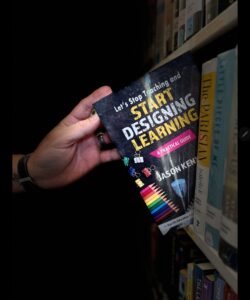The conversation tends to start in a couple different places. It can be in the car during the ride home. It might be at the dinner table in between mouthfuls. It might even be right before the light switch is clicked off at bedtime. At some point, the question passes from parent to child regarding what took place at school during the day. While, typically, this question comes in one of two forms when we deliver it to our kids, we really should be asking something very different about their day.
DON’T ASK THIS: “What Did You Do At School Today?”
This might be one way a parent tries to initiate the conversation about the school day with a child. Depending on the age and interest level, you may get different responses when you ask it. Typically with our younger kids, we get some details, especially when something out of the ordinary might have happened. You may go down all sorts of rabbit holes regarding all manner of human behavior when you ask this loaded question to a Kindergartener. When you do ask it to a little one, make sure you have a pen, paper or cellphone handy to record especially entertaining answers.
As they grow older, the details tend to fade. The responses dwindle in their descriptions. Eventually, you will get a “Nothing,” thrown your way in response on or around middle school (sometimes before that). This will inevitably devolve into grunts and shoulder shrugs in response to your inquiry. Don’t let your feelings get hurt. It will happen eventually. Besides, we probably did the same to our parents.
The issue with getting an answer lies in the question itself. What did you DO at school today? If I were to respond as a student, I would say something like, “I did what we always do. Went to class, did some worksheets.” This is because the question centers around the idea that school is a place where kids go to “do” stuff. Thus, we make school a place of “doing” more than a place of “learning.” Doing is about compliant behaviors like going to class, interacting respectfully with others, taking notes, completing work, even eating lunch. There may not be much a student latches onto as memorable in the “doing” of school in the day-to-day. Sure, there’s times where unique projects or out of the ordinary interactions happen and that might come out. But really, “What did you do at school today?” doesn’t really get to the reason why we sent the kids there in the first place.
DON’T ASK THIS: “What Did You Learn At School Today?”
So, we didn’t send the kids to school to “do stuff,” we sent them there to learn something after all. Well, what’s wrong with asking them what they learned? While I agree it is a better question than the prior, we can ask a better one. “What did you learn today?” does place a more specific focus for the answer, but the focus may result in a broad and generic answer from our kids. When we ask our kids what they learned, more often than not, if you get a response beyond, “not much” or “nothing” from the older ones, you will get a list of topical content.
We learned about Australia. We learned about division. We learned about the phases of the moon. A lot of content may come out in response. That’s when we as the adults say, “Well, that’s good,” as a blanket or we will dive deep into a topic with some follow up questions. The follow-ups tend to lead to some long pauses, an occasional “ummmmmm” and eventually result in a scattering of a few random facts picked up about the topic by our kids. They are mentally skimming over the footage of the day, grabbing any interesting highlights, and reporting out.
We might find ourselves content with some answer like this. But we have to ask ourselves, “What does this really tell me about my kid’s learning?” Kids can, and do, pick up a lot more content knowledge to regurgitate from Youtube or Tiktok. So, what can we ask to really hone in on what we want our kids to get out of their daily experience at school?
DO ASK: “What Feedback Did You Get Today?”
There’s a lot to unpack about this question. More than you realize on its surface. But it is one that can be a game changer if we want to really know more about our kids and their learning at school. It helps shift the conversational responses into one that is centered on the reason we sent them to school in the first place.
It Focuses on Processes, Understanding & Growth: Learning isn’t just about absorbing information; it’s also about understanding how to improve and develop real understanding. This encourages our kids to think about how they are progressing, what they’re doing well, and where they might need to improve. By asking the first two questions, you are focusing on compliance and content. This question is about where you are in your learning, where you want to go, and what your teacher suggested your next steps to be in order to get there. Kids now get to tell you where they tripped up, how they preserved through, and where they are going next in their learning. Not just what they did or what topics they covered.
It Encourages Reflection & Mindsets: When we ask about feedback, it prompts kids to reflect on their interactions with teachers, peers, content, and their own performance in their learning. This reflection can lead to a deeper understanding of their learning, helping them recognize areas of strength and areas that may require more attention. This aligns well with the concept of a growth mindset, where challenges and mistakes are seen as opportunities for learning and improvement. We don’t learn by getting everything correct. If we get everything right, not making any mistakes, that just means we already knew it. Make mistakes and feedback valuable components of the learning process by asking about them.
It Takes Pressure Off and Turns Conversations On: We just finished looking at normalizing mistakes as part of learning. Asking about feedback creates a more relaxed environment for conversation. Our kids might feel less pressure to perform by not having to come up with specific academic details on the spot. It’s not about regurgitating facts and content. This can lead to more genuine and meaningful discussions about their learning. Feedback itself often involves discussions about specific instances, interactions, and experiences. Asking about it can lead to more detailed and insightful conversations, helping us gain a better understanding of our kids’ learning.
Asking about feedback, instead of about the work or about the content, can really open our eyes to the level of learning and learning experiences our kids are getting at school. We, as educators, must be vigilant about feedback. It can’t only come in the form of a grade on the top of the paper. We have to make feedback a meaningful part of the learning process if we are to see the gains in our learners we want to see. We, as parents, must be equally vigilant in asking about feedback, to ensure that our kids aren’t just going to school to “do stuff” and haphazardly absorb content. Asking the right questions helps get us, and our kids, the learning we all want to hear about at the end of the day.


